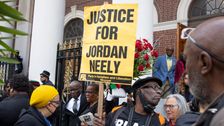Marine veteran Daniel Penny on Sunday argued against key claims made against him in the killing last month of Jordan Neely on a subway in New York City, disputing a witness’s claim that he held Neely down for 15 minutes and denying that he put a chokehold on him.
Penny, 24, has made several public remarks about his fatal interaction with 30-year-old Neely, a street performer who had mental health issues — including in an interview with the New York Post and a public statement on video that was released through his attorneys on Sunday — apparently attempting to paint himself as a “good Samaritan” seeking to protect people on the train against a confrontational man, including Neely himself.
Penny was captured on a bystander video putting Neely in a chokehold on a New York City subway train on May 1. Journalist Juan Alberto Vazquez, who recorded part of the encounter, estimated that Penny held Neely in a chokehold for 15 minutes.
In an interview with the court reporting news site Law & Crime, Penny denied that claim and instead offered his own estimation that he restrained Neely for “less than five minutes.”
Penny also denied that he had Neely in a chokehold, despite video of Neely’s death. Two days after the fatal encounter, the New York City medical examiner’s office announced that Neely had died from “compression to his neck as a result of the chokehold” and ruled his death a homicide.
Neely’s killing led to protests calling for Penny’s arrest and heightened discourse about race, homelessness and mental health. Penny was charged with manslaughter in the second degree 10 days after Neely’s death, following days of protest and outcry.
In his Sunday remarks, Penny argued that Neely appeared to be on drugs, that Neely was threatening others on the train and that he held Neely in a chokehold for roughly only five minutes. Penny also insisted that he didn’t mean to choke Neely to death but instead meant to restrain him until police arrived.
“I acted in a way that protect the other passengers, protect myself and protect Mr. Neely,” Penny said.
“I was trying to keep him on the ground until the police came. I was praying that the police would come and take this situation over,” Penny said.
Neely, a Black man, was known for his Michael Jackson impersonation. Penny, who is white and who continually labeled Neely a threat, has been accused of acting with anti-Black bias.
“I didn’t see a Black man threatening passengers. I saw a man threatening passengers. A lot of whom were people of color,” Penny said Sunday, echoing statements he made in May.
Still, Penny’s characterization of Neely echoes comments that anonymous police sources have made to news organizations in the days after the killing, which attempt to demonize Neely while hailing Penny as a hero.
As JS’s Matt Schuman pointed out, journalists later uncovered details of the killing that appear to contradict claims from unnamed sources that Neely was threatening.
“[Penny] cannot rewrite how the story ends,” Lennon Edwards, one of Neely’s family attorneys, said in May. “The story ends with his arms wrapped around Jordan’s neck, choking him to death, and that’s what he has to pay for.”
Attorneys for Neely’s family did not immediately respond to JS’s request for comment.


